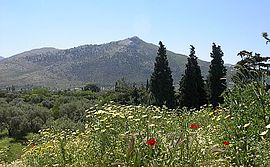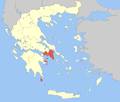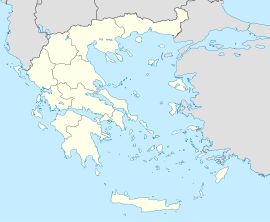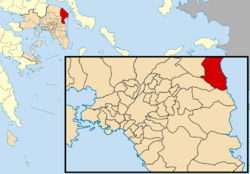- Marathon, Greece
-
Marathon
Μαραθώνας
The plain of Marathon todayLocation Coordinates 38°9′N 23°57′E / 38.15°N 23.95°ECoordinates: 38°9′N 23°57′E / 38.15°N 23.95°E Government Country: Greece Region: Attica Regional unit: East Attica Mayor: Spýros Zágaris Population statistics (as of 2001) Municipality - Population: 26,899 - Area: 226.6 km2 (87 sq mi) - Density: 119 /km2 (307 /sq mi) Municipal unit - Population: 8,883 - Area: 97.1 km2 (37 sq mi) - Density: 91 /km2 (237 /sq mi) Other Time zone: EET/EEST (UTC+2/3) Elevation: 0 m (0 ft) Postal: 190 07 Telephone: 22940 Auto: Z Website www.marathon.gr Marathon (Demotic Greek: Μαραθώνας, Marathónas; Attic/ Katharevousa: Μαραθών, Marathṓn) is a town in Greece, the site of the battle of Marathon in 490 BC, in which the heavily outnumbered Athenian army defeated the Persians. The tumulus or burial mound (Greek Τύμβος, tymbos, i.e. tomb) for the 192 Athenian dead that was erected near the battlefield remains a feature of the coastal plain.[1] The Tymbos is now marked by a marble memorial stele and surrounded by a small park.
Contents
History
The name of the athletic long-distance endurance race, the "marathon", comes from the legend of Pheidippides, a Greek runner, who was sent from the town of Marathon to Athens to announce that the Persians had been miraculously defeated in the Battle of Marathon. It is said that he ran the entire distance without stopping, but moments after proclaiming his message "Nenīkēkamen" ("We have won!") to the city, he collapsed from exhaustion. The account of the run from Marathon to Athens first appears in Plutarch's On the Glory of Athens in the 1st century AD, which quotes from Heraclides Ponticus' lost work, giving the runner's name as either Thersipus of Erchius or Eucles. Lucian of Samosata (2nd century AD) also gives the story but names the runner Philippides (not Pheidippides). The Greek historian Herodotus, the main source for the Greco-Persian Wars, mentions Pheidippides as the messenger who ran from Athens to Sparta asking for help. In some manuscripts of Herodotus the name of the runner between Athens and Sparta is given as Philippides.[2]
In Ancient Greece, the messengers (day-runners) who carried the news of war from one city to another, enjoyed great esteem and respect; the roads were problematic, they had to pass through hostile territory, and traveling posed great dangers at that time. The states would assign specially trained "messengers" or "runners" or "road-heralds”, with great stamina and strength of character to carry messages in times of war as well as peace.
The sport of Marathon was established during the first modern Olympics held in Athens in 1896. The idea to include the event in the program of the Olympic Games was of French philosopher and professor at the Sorbonne, Michel Breal, a friend of Pierre de Coubertin, the man who contributed decisively to the founding of the modern Olympic Games. He proposed the introduction of an endurance road race under the name "Marathon" which would start from the region where in 490 BC the battle of the Greeks against the Persians occurred and would end at the Pnyx of Ancient Athens, where, presumably, the messenger arrived bringing the good news of victory to the Athenians. The International Olympic Committee (IOC) accepted his proposal.[3][4] Michel Breal did not know exactly what the distance was and how difficult the sport would be - the first marathon was 40,000 meters long. In 1924, the 42,195 meters long Marathon became the standard that is today.
There are two roads out of the battlefield of Marathon towards Athens, one more mountainous towards the north whose distance is about 34.5 km (21.4 mi), and another flatter but longer towards the south with a distance of 40.8 km (25.4 mi). It has been successfully argued that the ancient runner took the more difficult northern road because at the time of the battle there were still Persian soldiers in the south of the plain.
Marathon (μάραθον) is the Greek word for fennel. It is believed that the town was originally named so because of an abundance of fennel plants in the area. After Miltiades (the general of the Greek forces) defeated Darius' Persian forces, the Persians decided to sail from Marathon to Athens in order to sack the unprotected city. Miltiades ordered all his hoplite forces to 'Double-time' march back to Athens. So by the time Darius' troops arrived, they saw the same Greek force waiting for them.
The sophist and magnate Herodes Atticus was born in Marathon. In 1926, the American company ULEN began construction on the Marathon Dam in a valley above Marathon, in order to ensure water supply for Athens. It was completed in 1929. About 10 km² of forested land were flooded to form Lake Marathon. The Dionysos-Nea Makri road, part of GR-83, passes through a traffic-light-controlled one-lane driveway on the crest of the dam wall. The plain area lies to the southeast.
The beach of Schinias is located southeast of the town and it is a popular windsurfing spot and the Olympic Rowing Center for the 2004 Summer Olympics is also located there. At the 1896 and 2004 Summer Olympics, Marathon was the starting point of the marathon races (for both women and men in 2004).[3][5] The area is susceptible to flash flooding, because of forest fires having denuded parts of the eastern slopes of Mount Penteli especially in 2006.
Municipality
The municipality Marathon was formed at the 2011 local government reform by the merger of the following 4 former municipalities, that became municipal units:[6]
- Grammatiko
- Marathon
- Nea Makri
- Varnavas
Population
Year Town population Municipality population 1981 4,841 - 1991 5,453 12,979 2001 4,399 8,882 The other settlements in the municipal unit are Agios Panteleimonas (pop. 1,489), Kato Souli (1,477), Vrana (731), Avra (235), Votho (207), Ano Souli (188), and Schinia (156).
Points of interest
- Kato Souli Naval Transmission Facility with its 250 metres tall radio mast, the tallest structure in Greece.
See also
- List of municipalities of Attica, Communities of Attica
- Dimitrion Yordanidis, oldest man to have run the marathon, at age 98
References
- ^ Aerial photograph in John Boardman, Jasper Griffin and Oswyn Murray, Greece and the Hellenistic World (Oxford History of the Classical World) 1988, vol. I p. 34.
- ^ Herodotus, The Histories (Penguin Books: New York, 1977) p. 425.
- ^ a b Wallechinsky, David and Jaime Loucky (2008). "Track & Field (Men): Marathon". In The Complete Book of the Olympics: 2008 Edition. London: Aurum Press Limited. p. 133.
- ^ 1896 Summer Olympics official report. Volume 2. pp. 86-90.
- ^ 2004 Summer Olympics official report. Volume 2. p. 242.
- ^ Kallikratis law Greece Ministry of Interior (Greek)
External links
Northwest: Kapandriti and Varnavas North: Grammatiko Northeast: Grammatiko, Aegean Sea West: Stamata Marathon East: Aegean Sea Southwest: Rodopoli South: Nea Makri Administrative division of the Attica Region Area: 3,808km² • Population: 3,761,810 (2001) • Capital: AthensRegional unit of Central AthensAthens • Dafni–Ymittos • Filadelfeia–Chalkidona • Galatsi • Ilioupoli • Kaisariani • Vyronas • Zografou Regional unit of North AthensAgia Paraskevi • Amarousio • Chalandri • Filothei–Psychiko • Irakleio • Kifisia • Lykovrysi–Pefki • Metamorfosi • Nea Ionia • Papagou–Cholargos • Penteli • VrilissiaRegional unit of West AthensRegional unit of South AthensAgios Dimitrios • Alimos • Elliniko–Argyroupoli • Glyfada • Kallithea • Moschato–Tavros • Nea Smyrni • Palaio FaliroRegional unit of PiraeusRegional unit of East AtticaAcharnes • Dionysos • Kropia • Lavreotiki • Marathon • Markopoulo • Oropos • Paiania • Pallini • Rafina–Pikermi • Saronikos • Spata–Artemida • Vari–Voula–VouliagmeniRegional unit of West AtticaRegional unit of IslandsRegional governor: Ioannis Sgouros (el) • Website: www.patt.gov.gr
Regional unit of North AthensAgia Paraskevi • Amarousio • Chalandri • Filothei–Psychiko • Irakleio • Kifisia • Lykovrysi–Pefki • Metamorfosi • Nea Ionia • Papagou–Cholargos • Penteli • VrilissiaRegional unit of West AthensRegional unit of South AthensAgios Dimitrios • Alimos • Elliniko–Argyroupoli • Glyfada • Kallithea • Moschato–Tavros • Nea Smyrni • Palaio FaliroRegional unit of PiraeusRegional unit of East AtticaAcharnes • Dionysos • Kropia • Lavreotiki • Marathon • Markopoulo • Oropos • Paiania • Pallini • Rafina–Pikermi • Saronikos • Spata–Artemida • Vari–Voula–VouliagmeniRegional unit of West AtticaRegional unit of IslandsRegional governor: Ioannis Sgouros (el) • Website: www.patt.gov.grVenues of the 1896 Summer Olympics Athens Lawn Tennis Club · Bay of Zea · Kallithea · Marathon (city) · Neo Phaliron Velodrome · Panathinaiko Stadium · ZappeionOAKA Athens Olympic Aquatic Centre · Athens Olympic Tennis Centre · Athens Olympic Velodrome · Olympic Indoor Hall · Olympic StadiumHOC Fencing Hall · Helliniko Indoor Arena · Olympic Baseball Centre · Olympic Canoe/Kayak Slalom Centre · Olympic Hockey Centre · Olympic Softball StadiumFaliro Faliro Olympic Beach Volleyball Centre · Faliro Sports Pavilion Arena · Peace and Friendship StadiumGOC Goudi Olympic Hall · Olympic Modern Pentathlon CentreFootball venues Other venues Agios Kosmas Olympic Sailing Centre · Ano Liosia Olympic Hall · Galatsi Olympic Hall · Kotzia Square · Marathon (city) · Markopoulo Olympic Equestrian Centre · Markopoulo Olympic Shooting Centre · Nikaia Olympic Weightlifting Hall · Panathinaiko Stadium · Parnitha Olympic Mountain Bike Venue · Peristeri Olympic Boxing Hall · Schinias Olympic Rowing and Canoeing Centre · Stadium at Olympia · Vouliagmeni Olympic CentreList of Olympic venues in cycling 1896: Marathon (city), Neo Phaliron Velodrome • 1900: Vélodrome de Vincennes • 1904: Francis Field • 1908: White City Stadium • 1912: Liljeholmen, Mälaren • 1920: Antwerp, Vélodrome d'Anvers Zuremborg • 1924: Stade de Colombes, Vélodrome de Vincennes • 1928: Amsterdam, Olympic Stadium • 1932: Los Angeles Avenue, Pacific Coast Highway, Rose Bowl in Pasadena, Vineyard Avenue • 1936: Avus Motor Road, BSV 92 Field & Stadium • 1948: Herne Hill Velodrome, Windsor Great Park • 1952: Käpylä, Maunula, Pakila, Velodrome • 1956: Broadmeadows, Velodrome • 1960: Olympic Velodrome, Via Cassia, Via Flaminia, Via Cristoforo Colombo, Via di Grottarossa • 1964: Hachioji City, Hachioji Velodrome • 1968: Agustín Melgar Olympic Velodrome, Satellite Circuit • 1972: Bundesautobahn 96, Grünwald, Radstadion • 1976: Mount Royal Park, Olympic Velodrome, Quebec Autoroute 40 • 1980: Krylatskoye Sports Complex Cycling Circuit, Krylatskoye Sports Complex Velodrome, Moscow-Minsk Highway • 1984: Artesia Freeway, Olympic Velodrome, Streets of Mission Viejo • 1988: Olympic Velodrome, Tongillo Road Course • 1992: A-17 highway, Circuit de Catalunya, Sant Sadurní Cycling Circuit, Velòdrom d'Horta • 1996: Cycling road course, Georgia International Horse Park, Stone Mountain Park Archery Center and Velodrome • 2000: Centennial Parklands, Dunc Gray Velodrome, Fairfield City Farm • 2004: Athens Olympic Velodrome, Kotzia Square, Parnitha Olympic Mountain Bike Venue, Vouliagmeni Olympic Centre • 2008: Laoshan Bicycle Moto Cross (BMX) Venue, Laoshan Mountain Bike Course, Laoshan Velodrome, Urban Road Cycling Course • 2012: BMX Circuit, Hadleigh Farm, London Velodrome, Hampton Court Palace • 2016: Barra Velodrome, Flamengo Park, Olympic BMX Center, Olympic Mountain Bike Park Categories:
Categories:- Populated places in East Attica
- 1896 Summer Olympic venues
- 2004 Summer Olympic venues
- Olympic athletics venues
- Olympic cycling venues
- Ancient Greek cities
- Municipalities of Attica
- Battle of Marathon
Wikimedia Foundation. 2010.



